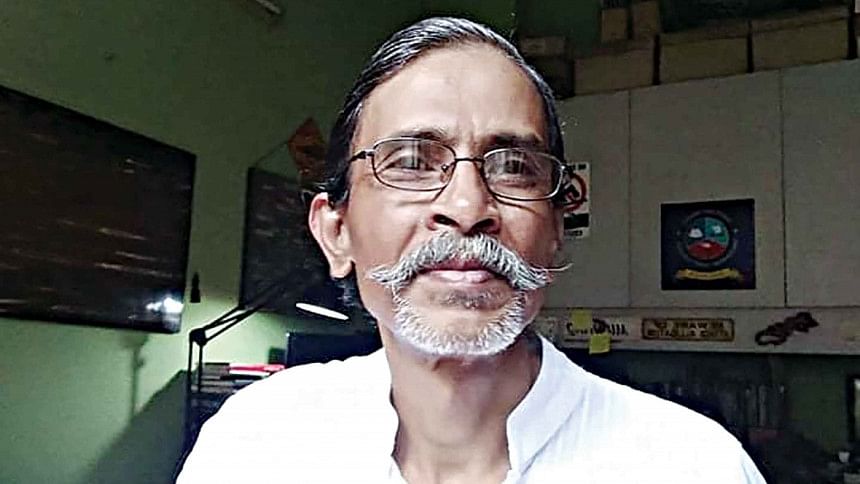Mushtaq’s grim punishment for the most ‘unspeakable’ crime

How should a country treat its detainees/prisoners, especially in the middle of a global pandemic? Bangladesh seems to have taken a surprisingly modern approach, with the Department of Prisons announcing its plan this week to vaccinate around 15,000 convicts in Bangladeshi jails in the first phase. When the pandemic first hit the country, almost 3,000 prisoners convicted of minor offences were released from overcrowded prisons, where they ran high risks of contracting Covid-19. According to a blog post written by a Supreme Court judge and Board member of Penal Reform International, a whopping 20,938 adults were released from pre-trial detention after 33,287 bail petitions were heard in only 10 working days during lockdown, and all the proceedings were conducted over virtual hearings.
One cannot help but congratulate the authorities involved in this efficient and compassionate treatment of detainees during the pandemic. Because it would be unjust, wouldn't it, to incarcerate people, for months on end, without granting them bail and without charging them for the crimes that they have been accused of? Given the pandemic situation and the need for distancing, it would be downright cruel, wouldn't it—to separate people from their families for two-thirds of a year, allowing no visitors and no trips out of their prison cells, days after days, without even giving them the opportunity of a fair trial? Surely, there would be some sort of mitigating circumstances, like a spouse suffering from mental health issues, or the care of the elderly parents of the detained (and not yet charged), that would deter our judiciary from such hard-hearted treatment of Bangladeshi citizens during an unprecedented global pandemic?
Unless of course, the offence committed is so severe that it is listed as "non-bailable". Under the 1860 Penal Code of Bangladesh, 237 offences are listed as bailable. This includes "attempt to commit homicide" (Section 309), "causing death by rash or negligent act" (Section 304A), "rioting armed with deadly weapon" (Section 148) and "voluntarily causing hurt/grievous hurt/hurt by dangerous weapon" (Sections 323-325)—some very serious crimes indeed, all of which still gives the accused the right to be granted bail and go home to their families while they await trial. Part IX of the Code of Criminal Procedure 1898 also lays out the circumstances when bail may be taken even in the case of non-bailable offences, which includes offences that hold the highest possible punishment of a death penalty, acts of war, mutiny, and more recently—the sharing of Facebook posts (apologies, I meant "spreading rumours").
Because that is what writer Mushtaq Ahmed was ultimately accused of, wasn't he? On May 6, 2020, Mushtaq Ahmed—known amongst his peers for an eccentric obsession with crocodiles that led to him establishing the first crocodile farm in Bangladesh and writing the book Kumir Chashir Diary—was arrested by RAB under the Digital Security Act for "spreading rumours and carrying out anti-government activities". According to the first information report from that same day, the entirety of the case against Mushtaq and cartoonist Ahmed Kishore involved a collection of 10 social media posts and links, which included cartoons drawn by Kishore, shared on a satirical Facebook page they were both administrators of. In those 10 links and posts that questioned/mocked the healthcare system of this proud nation, they managed to—according to the report—"spread propaganda against the Liberation War of Bangladesh, Father of the Nation, National Anthem, and National Flag; tarnish the image of the nation; spread confusion; create hostility, hatred among people; destroy communal harmony or create unrest, disorder; and threaten to deteriorate law and order."
Mushtaq's obsession may have been with crocodile farming, but he was clearly an author of the highest calibre, to be able to do so much in so few posts.
According to Section 40 of the DSA, "the Investigating Officer shall complete the investigation within 60 (sixty) days from the date of getting charge of investigation of an offence". If the IO fails to complete the investigation within this date, he can request a further 15 days, and if that fails too, the Tribunal in question can extend the investigation for another 30 days. If that also fails, the investigation can be extended "up to a reasonable period".
The investigation into Mushtaq and Kishore took nine months to complete. Their social media commentary must have truly been explosive, for nine months to be considered a "reasonable period of investigation"; that too, with bail being denied as many as six times, according to their legal team. Their trial might have been as sensational as the one of ex-MP Papul in Kuwait, who is also responsible for tarnishing the image of our nation, although he had the good sense to keep his criminal activities limited to human trafficking and stayed out of the murky waters of spreading rumours about the nation.
Sadly, we will never know exactly what kind of "conspiracy" was being hatched because Mushtaq, who was arrested on May 6, 2020—and who left prison for the first time since then on February 23, 2021, only to be denied bail once again—died on Thursday night. On February 23, his family had no idea that he was to be produced in front of court and so missed the opportunity to meet him, one final time. After nine months of incarceration, his elderly parents finally got to see their son's lifeless body in a prison hospital.
Mushtaq may be the first casualty of the Digital Security Act, but will he be the last? Until the autopsy report, we will not know what killed him, but in their last court hearing, this daily's court reporter described both Mushtaq and Kishore as "looking gaunt and haggard, their clothes hanging loose off their frames". Since Mushtaq's death, Kishore's brother has told media that he fears for Kishore's life. He drew cartoons, and now his family fears for his life.
In our journey as a nation, we have now reached an important crossroad. On Friday, the United Nations Committee for Development Policy in its second triennial review found that Bangladesh met all three criteria—in terms of gross national income, human assets index and economic vulnerability index—to comfortably graduate from its least-developed country (LDC) status. It is now clear that Bangladesh is no longer a "basket-case", nor is it a military dictatorship or a failed democracy—our economy has survived (and at times, even thrived) a crushing global pandemic, our vaccine rollout is in the top 10 of the world and our rights are codified in our Constitution, a brilliant document that provides us with the framework for a functional parliamentary democracy, complete with fundamental human rights/freedoms and an independent judiciary; a document handcrafted by the Father of the Nation himself.
So why then, are cartoonists, writers, journalists, editors and musicians languishing in jail for their opinions? Why is the "image of our nation" so fragile that any odd opinion on Facebook, regardless of how well-informed or misinformed it is, can be counted as a conspiracy to "tarnish" it? Why are our detainees/prisoners being treated like criminals—or worse, because even criminals are meant to have their constitutional rights—without the opportunity of a fair hearing before an impartial judiciary? Why is social media, which is essentially meant to be a democratic space, being indiscriminately policed under a draconian law that has no place in a modern society? As citizens who love this country and are proud of its achievements, I believe we are entitled to these answers.
One also cannot help but reflect upon the significance of Mushtaq dying in the historic month of February. Sixty-nine years ago, in this month, our people gave their lives for our right to speak. Back then, our words were taken away by our Pakistani oppressors. Six years ago, in February, writer and blogger Avijit Roy had his speech taken away from him too, when he was hacked to death in public by militants. Back then, it was the forces of terrorism who took our words from us. In 2021, who shall be held responsible for silencing us now?
Shuprova Tasneem is a member of the editorial team at The Daily Star.

 For all latest news, follow The Daily Star's Google News channel.
For all latest news, follow The Daily Star's Google News channel. 



Comments